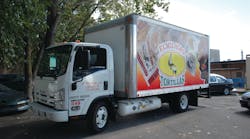El Milagro (www.el-milagro.com) is a tortilla products manufacturer based in Chicago, IL. The 64-year-old, family-owned company produces corn and flour tortillas, tostadas, chips and taco shells. Its fleet of delivery vans transports products from its corn and flour manufacturing facilities in Chicago to customers in surrounding suburbs and north to Milwaukee, WI.
In total, El Milagro operates approximately 80 vehicles at its locations in Illinois, Georgia and Texas. Its 55-vehicle Chicago fleet has operated on propane autogas since 1998.
Autogas is the common name for liquefied petroleum gas (LPG) when it is used as a fuel in internal combustion engines in vehicles, as well as in stationary applications.
EARLY ALT FUEL ADOPTER
El Milagro is a long-time user of propane autogas. It first decided to try alternative fuels after the city of Chicago implemented new emissions standards in the late 1990s. At the time, El Milagro hired a third-party retrofitter to install a conversion kit on one of its gas-powered Isuzu Trucks (www.isuzucv.com).
“We received notice from state of Illinois that any fleet registered in the city of Chicago with more than 10 vehicles needed to have 10 percent of its vehicles running on an alternative fuel,” recalls Bobby Morales, El Milagro’s sales and distribution manager. “The city also put out an incentive to convert vehicles to run on alternative fuels and paid for 80 percent of the conversions.”
For its Chicago fleet, El Milagro has converted an average of two to three vehicles per year to propane autogas. In 2012, the company converted its entire fleet to new Isuzu NPR Series Low Cab Forward trucks using Bi-Phase Technologies’ (www.bi-phase.com) liquid propane electronic fuel injection systems. The system was pioneered and tested by another long-time propane user, Schwan’s Home Service (www.schwans.com), the largest direct-to-home frozen food delivery provider in the U.S.
The Isuzu trucks are configured with a 16-foot van body and make deliveries to grocery stores and small- to medium-sized retailers all over the Chicago area.
To service its large bi-fuel fleet, El Milagro installed on-site propane autogas infrastructure and a dispenser at one of its manufacturing sites. The company’s propane fuel provider covered the costs of two 800-gallon propane tanks and a dispenser. Morales says this has been a big benefit of the switch to an alternative fleet because “we can fuel at our own facility and don’t lose time going out to gas stations.”
Since the fuel provider owns the tanks and pumps, “if something breaks down, they come fix it without us spending a dime.”
PAYOFFS
Fuel savings with propane autogas have been the biggest payoff for El Milagro. Morales reports the company saves an average of 50 percent on fuel with propane autogas compared with gasoline.
“We save a lot of money on fuel,” he says. “Propane prices here fluctuate just like gasoline, but they are a little less than half what gasoline is at any given time. On top of that, the state had a rebate of 50 cents per gallon to use propane autogas, saving us even more.”
The combination of incentives and citywide alternative fuel programs has helped Chicago become a leader in emissions reductions. The public infrastructure for alternative fuels is growing in Illinois. According to the Alternative Fuels Data Center (www.afdc.energy.gov), the state has 336 public alternative refueling stations, more than 100 of which are propane autogas.
“It is very easy in many cities now, not just Chicago, to fill up publicly and just keep going,” notes Morales. “Now that propane is being sold in almost every city around us and in the suburbs, it’s one of the main advantages we have and is one more thing we keep in mind as we grow.”
NO MAINTENANCE ISSUES
El Milagro puts a lot of miles on its vehicles, running them for five years and about 240,000 miles. Some routes have stops every five to 10 minutes and others drive 10 to 15 miles to the next stop to deliver products to grocery stores, retailers and mom-and-pop stores, says Alex Camarrena, route supervisor at El Milagro.
Proven performance over the last 15 years with propane has translated into added value under the hood for the company, he says. Maintenance has not been an issue with its propane-autogas-fueled vans and it can now better predict vehicle upkeep needs.
“The spark plugs in the vehicles and some other parts do last longer with propane than with gasoline,” says Morales. “We still do the regular maintenance, but we don’t have to replace those parts as often. For instance, with plugs, you typically have to change them every 30,000 miles with gasoline, but you can go 60,000 miles with propane.”
El Milagro initially had to overcome misconceptions about alternative fuels, particularly the notion that propane autogas wouldn’t perform well in Chicago’s winter.
“I can tell you propane does especially well in the cold winter here where we originally thought we might have problems,” says Camarrena. “The new systems have been working just fine and we have no performance problems. They run just as well as gasoline and we don’t see a difference with or without heavy loads.”
An added benefit with propane autogas has been reduced emissions with the vehicles compared with conventional fuels, Morales notes. The bi-fuel vans have helped the company comply with U.S. EPA, city and statewide emissions standards.
In 2012, Illinois exempted El Milagro from emissions testing, further reducing maintenance cost on the autogas fleet.
MARKET INTEREST
El Milagro has been one of the biggest alternative fuel success stories for Isuzu Commercial Trucks of America. Isuzu, which offers both CNG and propane autogas conversions, has seen growing interest in alternative fuels over the years, particularly in Midwest markets, observes the company’s Mike Slivensky, corporate fleet sales manager.
“Cities like Chicago, Milwaukee and Minneapolis have the infrastructure and are starting to see more public stations where fleets can fuel up within a short distance,” he says “After working with El Milagro, we know the tax advantages and rebates in Chicago so we propose alternative fuels a lot more.”
As sales of propane autogas and alternative fuels grow, Slivensky and Isuzu district manager John Brockhaus say the large interest from customers has been the biggest driver of sales in their markets. Whether it is LPG or CNG, a majority of the time customers – larger companies like El Milagro, as well as smaller retail businesses with one or two vehicles – want to know more about cost savings and going green.
“As the EPA pushes clean fuels more, and costs come down for manufacturers and customers, this market will only continue to grow,” Brockhaus predicts.




